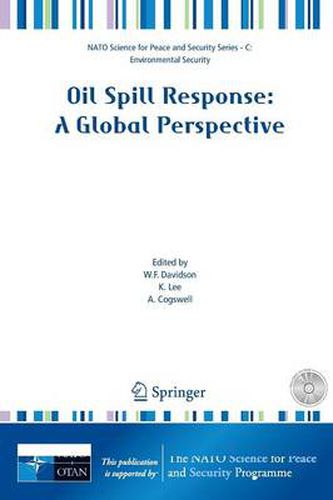Readings Newsletter
Become a Readings Member to make your shopping experience even easier.
Sign in or sign up for free!
You’re not far away from qualifying for FREE standard shipping within Australia
You’ve qualified for FREE standard shipping within Australia
The cart is loading…






This title is printed to order. This book may have been self-published. If so, we cannot guarantee the quality of the content. In the main most books will have gone through the editing process however some may not. We therefore suggest that you be aware of this before ordering this book. If in doubt check either the author or publisher’s details as we are unable to accept any returns unless they are faulty. Please contact us if you have any questions.
International experts in the field of oil spill response, including reprsentatives from 26 NATO countries, participated in a workshop in Canada to discuss their experience in the development and application of current and emerging technologies for oil spill response in the marine environment. These presentations which form the basis of chapters in this book provide a practical viewpoint of methods used to deal with oil spills under the variety of environmental conditions found in the marine environment. In particular, focus is given to the evaluation of oil spill countermeasures for use under arctic conditions in light of anticipated regional increases in marine traffic (e.g. Northwest Passage) and industrial activities (e.g. offshore oil and gas exploration) in the future.
This book provides a timely international perspective on applied research and development, technology transfer, and lessons learned from field trials and actual case studies associated with recent spill events. Topics include Preparedness/Contingency Planning, (Eco-terrorism); Oil Spill Fate and Transport (Environmental Persistence, Remote Sensing, modelling, Biodegradation), Biological Effects (Environmental Effects Monitoring and Environmental Risk Assessment); and Operational Response (Containment/Recovery Treating Agents, Shoreline Cleanup, In-situ Burning, Emerging Response Strategies). This book provides a synopsis as to the methods currently employed to deals with spills and an insight on future technologies under development.
$9.00 standard shipping within Australia
FREE standard shipping within Australia for orders over $100.00
Express & International shipping calculated at checkout
This title is printed to order. This book may have been self-published. If so, we cannot guarantee the quality of the content. In the main most books will have gone through the editing process however some may not. We therefore suggest that you be aware of this before ordering this book. If in doubt check either the author or publisher’s details as we are unable to accept any returns unless they are faulty. Please contact us if you have any questions.
International experts in the field of oil spill response, including reprsentatives from 26 NATO countries, participated in a workshop in Canada to discuss their experience in the development and application of current and emerging technologies for oil spill response in the marine environment. These presentations which form the basis of chapters in this book provide a practical viewpoint of methods used to deal with oil spills under the variety of environmental conditions found in the marine environment. In particular, focus is given to the evaluation of oil spill countermeasures for use under arctic conditions in light of anticipated regional increases in marine traffic (e.g. Northwest Passage) and industrial activities (e.g. offshore oil and gas exploration) in the future.
This book provides a timely international perspective on applied research and development, technology transfer, and lessons learned from field trials and actual case studies associated with recent spill events. Topics include Preparedness/Contingency Planning, (Eco-terrorism); Oil Spill Fate and Transport (Environmental Persistence, Remote Sensing, modelling, Biodegradation), Biological Effects (Environmental Effects Monitoring and Environmental Risk Assessment); and Operational Response (Containment/Recovery Treating Agents, Shoreline Cleanup, In-situ Burning, Emerging Response Strategies). This book provides a synopsis as to the methods currently employed to deals with spills and an insight on future technologies under development.